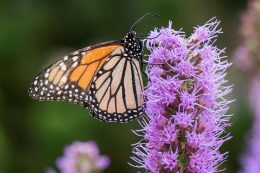 Butterfly gardening is becoming more popular with Kansans. Providing for the basic needs of butterflies, such as food, shelter and liquids, will encourage butterflies to visit this summer.
Butterfly gardening is becoming more popular with Kansans. Providing for the basic needs of butterflies, such as food, shelter and liquids, will encourage butterflies to visit this summer.
A number of plants attract butterflies. However, different species of butterflies prefer different plants. Using a variety of plant material that vary in blooming times of day and year helps attract a diverse group of visitors. Plant groups of the same plant together; a single plant is difficult for a butterfly to detect. If trying to attract a certain species of butterfly, learn which plant(s) that butterfly prefers, and then emphasize that plant in your planting. Annuals that attract butterflies include ageratum, cosmos, French marigold, petunia, verbena and zinnia.
Perennials and shrubs can be split into those that bloom early, mid-season and late. Good choices for those that bloom early are allium, chives, forget-me-not and lilac. Bee balm, butterfly bush, black-eyed Susan, buttonbush, butterfly weed, daisy, daylily, gaillardia, lavender, lily, mint, phlox, privet, sunflower and veronica are fitting picks for mid-season bloom. Late bloomers include aster, glossy abelia and sedum.
Remember, there are other ways to encourage butterflies. Butterflies are cold-blooded and like open areas where they can sun themselves on cool days and shade to cool off when the sun is too intense.
Butterflies also need water. A simple way to make a butterfly pool is to take a bucket, fill it with gravel, and bury it to the rim. Now add water, sugar water or sweet drinks so that the butterflies can land on the gravel but still reach the liquid.
Ward Upham—Extension Associate, Dept. of Horticulture and Natural Resources